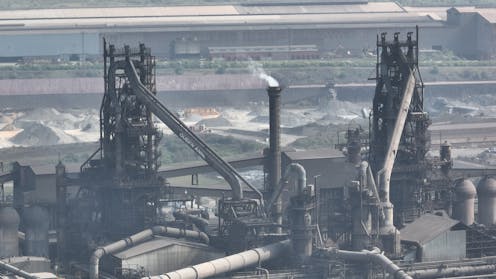Continuing to seek Chinese investment in the UK comes at a heavy political price
- Written by Jeffrey Henderson, Professor Emeritus of International Development, University of Bristol

One major consequence of the UK government’s resistance to rejoining[1] the European single market is that it is forced to go around the world seeking trade deals and investment.
Recently, the government has boasted of successful arrangements with India[2], the US[3], and some new agreements[4] with the EU. But it has also found itself courting one highly dubious suitor.
Since the chancellor of the exchequer, Rachel Reeves, went to Beijing[5] in January 2025, the government has been focusing much of its attention on China. And while investment from the world’s second-largest economy is fairly unproblematic in a few sectors (some services and domestic real estate, for example), other areas are a cause for concern[6].
Relying on Chinese money to support key sectors such as steel, telecommunications, advanced electronics, power and transport – all vital for Britain’s economic and geopolitical security – is potentially dangerous.
According to the CCP’s data, by 2017 it had established a formal presence[14] inside 92% of larger private companies and 73% of all private companies in China. Those figures will certainly be higher now. And, as with the digital-technology firm Huawei, senior CCP members are often on a company’s boards of directors[15].
So, while Jingye almost eliminated British Steel as a viable company, it can be reasonably assumed that a decision of such strategic and geopolitical importance would not have been taken by Jingye’s executives alone. They would have been “guided” by the CCP[16].
And of course, it’s not just steel production the UK should be concerned about. Chinese ownership now extends across many vital sectors.
There’s the Chinese state-owned company, Beijing Construction Engineering helping to build[17] a new science and innovation park next to Manchester airport. And the private Hong Kong company, CK Infrastructure which owns[18] water companies serving north-east England, Essex and Suffolk.
China Investment Corporation (state-owned) owns part of Heathrow[19], while China Huaneng (state-owned) operates Europe’s largest battery[20] storage facility in Wiltshire. Meanwhile, wind turbine producer Mingyang (privately owned and reputedly linked[21] to the Chinese military) is the preferred bidder for a new Scottish wind farm, despite being barred from a similar Norwegian development[22].
All of these companies, irrespective of formal ownership, are likely to be subject to varying degrees of CCP influence and control (comment on the issue from Chinese companies is rare). And successive UK governments have either failed to appreciate the implications of this, or have accepted it as the price of gaining greater access to the Chinese market – especially for London’s financial sector.
This was almost certainly a factor behind China’s involvement in the building of Hinkley Point’s[23] new nuclear power station, and was at the forefront in Rachel Reeves’s discussions with the Chinese government earlier this year[24].
Separately, Chinese investment in non-strategic sectors is much less controversial. One private conglomerate (Fosun) owns the Premier League side Wolverhampton Wanderers and formerly owned Thomas Cook[25].
But the lesson from the British Steel fiasco is clear. We are now in a world where the political interests of major states trump the economic interests of their business corporations. Geopolitics takes precedence over geoeconomics[26].
Consequently, Chinese firms – regardless of ownership status – should be barred from industries vital to the UK’s economic and political security. Anything less risks subordinating British interests to those of the Chinese Communist Party.
References
- ^ resistance to rejoining (commonslibrary.parliament.uk)
- ^ with India (theconversation.com)
- ^ the US (www.reuters.com)
- ^ new agreements (theconversation.com)
- ^ went to Beijing (www.gov.uk)
- ^ concern (onlinelibrary.wiley.com)
- ^ Sign up to our daily newsletter (theconversation.com)
- ^ considerable criticism (theconversation.com)
- ^ 2017 acquisition (www.theregister.com)
- ^ foreign corporate asset-stripping (www.theguardian.com)
- ^ moved to shut down operations (theconversation.com)
- ^ commented (www.theguardian.com)
- ^ EPA-EFE/Aaron Favila / POOL ID: 12735901 (epaimages.com)
- ^ established a formal presence (eastasiaforum.org)
- ^ boards of directors (www.cambridge.org)
- ^ been “guided” by the CCP (onlinelibrary.wiley.com)
- ^ helping to build (www.placenorthwest.co.uk)
- ^ which owns (www.cki.com.hk)
- ^ part of Heathrow (www.heathrow.com)
- ^ Europe’s largest battery (www.nsenergybusiness.com)
- ^ reputedly linked (www.newsweek.com)
- ^ Norwegian development (www.scotsman.com)
- ^ building of Hinkley Point’s (theconversation.com)
- ^ earlier this year (www.csri.global)
- ^ owned Thomas Cook (www.thebusinessdesk.com)
- ^ over geoeconomics (www.tni.org)







